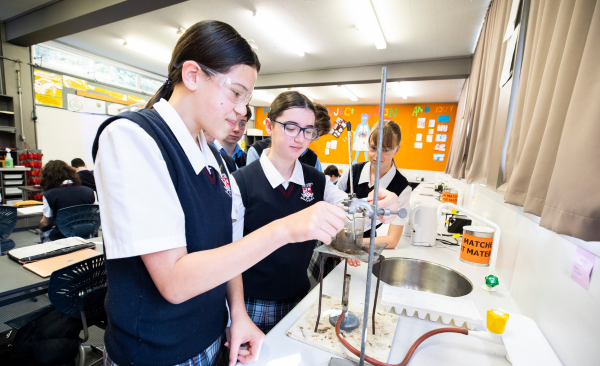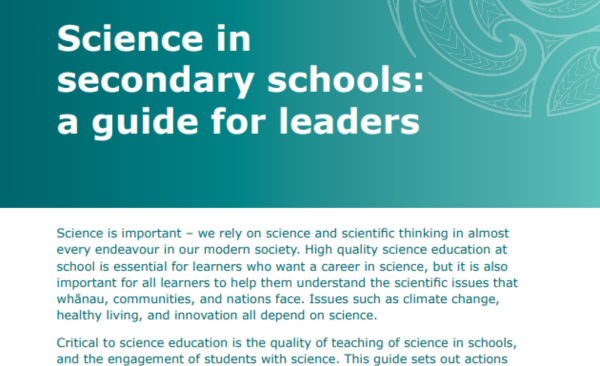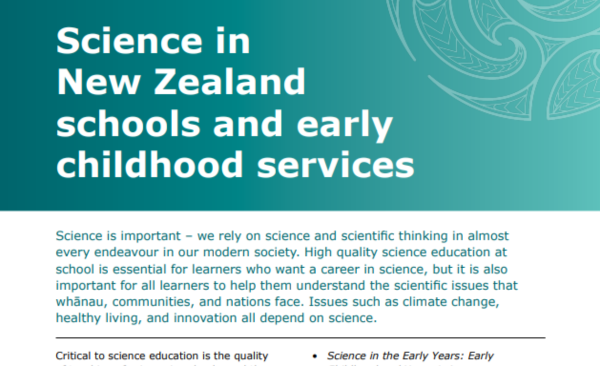Related insights
Explore related documents that you might be interested in.
Read Online
Achievement and engagement in science declines as students progress through school
ERO is concerned that the most recent national and international reports have indicated that New Zealand students may become less engaged with science as they move through the school. While many students are engaged, the disengaged students have indicated that they are not learning much science, see little value in science learning, and have few aspirations for a career in science.
Local and international evidence shows New Zealand students are not achieving as well in science as we would like. It also shows students become less engaged in science over time, and fewer 15-year olds see value in science compared with their international peers.
ERO is concerned that the most recent national and international reports have indicated that New Zealand students may become less engaged with science as they move through the school. While many students are engaged, the disengaged students have indicated that they are not learning much science, see little value in science learning, and have few aspirations for a career in science.
Local and international evidence shows New Zealand students are not achieving as well in science as we would like. It also shows students become less engaged in science over time, and fewer 15-year olds see value in science compared with their international peers.
Supporting teaching science
To support leaders and teachers to review and strengthen the science learning opportunities they provide, ERO explored the strategies and approaches a selection of schools had taken to increase students’ engagement in science.
Our report, Growing Curiosity: Teaching Strategies to Engage Years 5 to 11 Students in Science, goes into detail about these strategies and approaches, and shares examples of practice. This guide draws on the full report and aims to help you think about how you can strengthen science teaching and learning in your school.
To support leaders and teachers to review and strengthen the science learning opportunities they provide, ERO explored the strategies and approaches a selection of schools had taken to increase students’ engagement in science.
Our report, Growing Curiosity: Teaching Strategies to Engage Years 5 to 11 Students in Science, goes into detail about these strategies and approaches, and shares examples of practice. This guide draws on the full report and aims to help you think about how you can strengthen science teaching and learning in your school.
Reviewing science programmes
Strengthening science programmes starts with leaders and teachers recognising the importance of science not only for students with future science careers, but also for investigating issues and solving problems in everyday life. You could start reviewing your science programme by thinking about:
- how does the content of our science programme line up across year levels?
- how coherent is the programme?
- in what ways do our science programmes provide opportunities for students to be critical and creative thinkers?
- how well does the science programme support students to engage with science in ways that support their future pathways?
- how well does our science teaching support students’ everyday problem solving?
- where can we improve?
Think about what information sources you can draw on to help you answer these questions. They might include student surveys, individual teacher inquiries, and assessment information.
Once you have identified areas for improvement, plan how best to implement any changes. This might involve:
- creating action plans
- evolving the curriculum over time, taking note of what was successful and responding to the needs and interests of the current cohort of students.
Strengthening science programmes starts with leaders and teachers recognising the importance of science not only for students with future science careers, but also for investigating issues and solving problems in everyday life. You could start reviewing your science programme by thinking about:
- how does the content of our science programme line up across year levels?
- how coherent is the programme?
- in what ways do our science programmes provide opportunities for students to be critical and creative thinkers?
- how well does the science programme support students to engage with science in ways that support their future pathways?
- how well does our science teaching support students’ everyday problem solving?
- where can we improve?
Think about what information sources you can draw on to help you answer these questions. They might include student surveys, individual teacher inquiries, and assessment information.
Once you have identified areas for improvement, plan how best to implement any changes. This might involve:
- creating action plans
- evolving the curriculum over time, taking note of what was successful and responding to the needs and interests of the current cohort of students.
Carefully structured learning
When structuring learning programmes, you might draw on information you found during your review, such as the way the programme lines up across different year levels, or the overall coherence of the programme. It is helpful to also think about:
- how you build on students’ previous learning
- introducing new knowledge and skills in manageable amounts, to make learning successful for students
- providing opportunities to revisit key concepts and scientific skills
- what students need to be successful in later school years, and back-mapping a learning progression from there.
When structuring learning programmes, you might draw on information you found during your review, such as the way the programme lines up across different year levels, or the overall coherence of the programme. It is helpful to also think about:
- how you build on students’ previous learning
- introducing new knowledge and skills in manageable amounts, to make learning successful for students
- providing opportunities to revisit key concepts and scientific skills
- what students need to be successful in later school years, and back-mapping a learning progression from there.
Changing the focus
The Nature of Science is the unifying, overarching strand of science in the New Zealand Curriculum. Learning programmes focused on the Nature of Science support students to develop the skills, competencies, dispositions, and knowledge required to participate successfully in science. When focusing on the Nature of Science, you might:
- prompt students to ask questions and provide their own answers and solutions
- challenge students’ assumptions
- ask questions of students, to deepen their thinking
- invite predictions
- introduce students to relevant scientific investigations
- consider how to assess students’ learning in a variety of ways, to help understand their learning and progress in the Nature of Science; e.g. through assessing group work; observations of practical activities, assessing students’ learning through videos and oral presentations.
The Nature of Science is the unifying, overarching strand of science in the New Zealand Curriculum. Learning programmes focused on the Nature of Science support students to develop the skills, competencies, dispositions, and knowledge required to participate successfully in science. When focusing on the Nature of Science, you might:
- prompt students to ask questions and provide their own answers and solutions
- challenge students’ assumptions
- ask questions of students, to deepen their thinking
- invite predictions
- introduce students to relevant scientific investigations
- consider how to assess students’ learning in a variety of ways, to help understand their learning and progress in the Nature of Science; e.g. through assessing group work; observations of practical activities, assessing students’ learning through videos and oral presentations.
Working across subject departments
You can further support students’ learning in science by linking up with other subject departments. For example, you might:
- introduce maths concepts in science when students are practicing the same concept in their mathematics class
- consider how assessment tasks could be used for students to gain credits across subjects
- work with teachers in the English department about ways students can write up and present their learning.
Working in this way can give students consistent strategies to improve their progress and achievement in science.
You can further support students’ learning in science by linking up with other subject departments. For example, you might:
- introduce maths concepts in science when students are practicing the same concept in their mathematics class
- consider how assessment tasks could be used for students to gain credits across subjects
- work with teachers in the English department about ways students can write up and present their learning.
Working in this way can give students consistent strategies to improve their progress and achievement in science.
Examples of good practice in teaching science
Growing Curiosity: Teaching Strategies to Engage Years 5 to 11 Students in Science contains the following examples of good practice for science teaching and learning in secondary schools:
- Developing a well-structured curriculum, p. 45
- Developing authentic, place-based science programmes, p. 54
- Developing responsive and well-structured science programmes, p. 62
- Growing curious minds, p. 31
- Improving students’ engagement in and perceptions about science, p.36
- Ensuring all student engage in high quality science programmes, p. 40
- Developing a well-structured curriculum, p. 45
Growing Curiosity: Teaching Strategies to Engage Years 5 to 11 Students in Science contains the following examples of good practice for science teaching and learning in secondary schools:
- Developing a well-structured curriculum, p. 45
- Developing authentic, place-based science programmes, p. 54
- Developing responsive and well-structured science programmes, p. 62
- Growing curious minds, p. 31
- Improving students’ engagement in and perceptions about science, p.36
- Ensuring all student engage in high quality science programmes, p. 40
- Developing a well-structured curriculum, p. 45
Where can you go to for more help?
Ministry of Education Science hub: Science Online – scienceonline.tki.org.nz
NZCER: Science education publications – www.nzcer.org.nz/research/science- education
Nation of Curious Minds Science Hub – www.sciencelearn.org.nz
Ministry of Education Science hub: Science Online – scienceonline.tki.org.nz
NZCER: Science education publications – www.nzcer.org.nz/research/science- education
Nation of Curious Minds Science Hub – www.sciencelearn.org.nz



